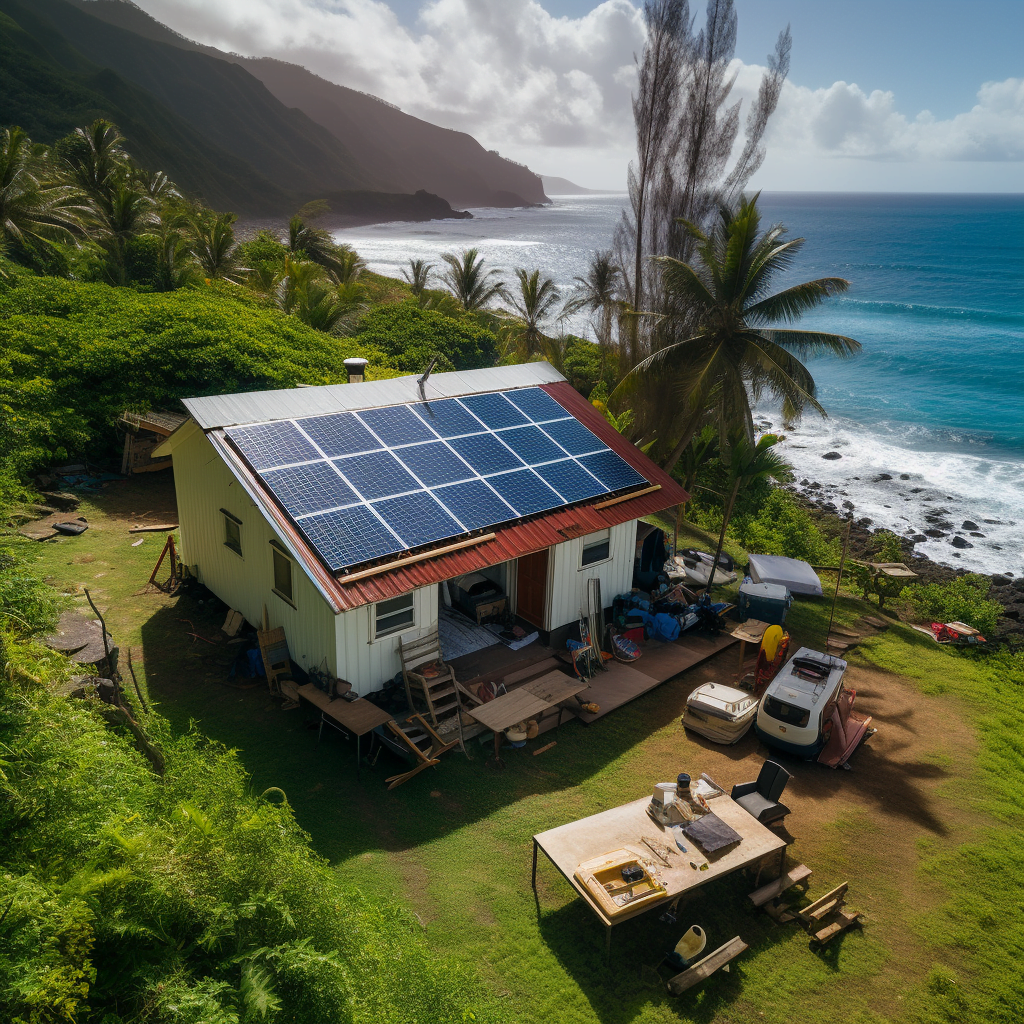Waking up to the sound of the ocean, surrounded by the majestic beauty of Hawaii, seems like a dream. But for those who yearn for a life untethered from the conventional grid, it’s a dream they’re eager to realize. Off-grid living in Hawaii isn’t just about the romance of independence; it’s a commitment to sustainability and a test of self-reliance. This comprehensive guide will walk you through the legalities and practicalities of disconnecting in the Aloha State, ensuring your off-grid dream doesn’t turn into a regulatory nightmare.
Understanding Off-Grid Living
What does “off-grid” mean? At its core, living off-grid means establishing a lifestyle that’s independent of public utilities for necessities like electricity, water, and waste management. It’s about creating a life that harmonizes with nature while respecting the laws that govern the land. Off-grid living typically involves:
- Energy Independence: Utilizing renewable energy sources such as solar, wind, or micro-hydro systems to generate your own power.
- Water Self-Sufficiency: Collecting rainwater or tapping into underground wells to secure a water supply.
- Waste Management: Implementing composting toilets and greywater systems to handle sewage and household water waste.
- Food Production: Growing your own fruits and vegetables, and possibly raising livestock, to provide for your dietary needs.
Hawaii, with its year-round sunshine, abundant rainfall, and fertile soil, presents an idyllic setting for such a lifestyle. However, the transition to off-grid living comes with a set of legal considerations that must be navigated with care.
Hawaii’s Energy Regulations
Hawaii’s commitment to renewable energy is unmatched, with ambitious goals set for a sustainable future. If you’re looking to harness the power of the islands’ natural resources, you’ll need to:
- Understand Hawaii’s Renewable Energy Framework: Familiarize yourself with the state’s energy policies, which encourage the use of renewable resources while ensuring safety and reliability.
- Obtain Permits for Solar and Wind Installations: Solar panels and wind turbines often require permits before installation. The Hawaii State Energy Office can provide guidance on the necessary steps.
- Comply with Electrical Codes: All electrical systems must adhere to the National Electrical Code (NEC), ensuring that your off-grid setup is both safe and legal.
Water Rights and Usage
Hawaii’s fresh water is a resource managed in the public interest, which means the state takes its stewardship seriously. For off-grid living, this translates to:
- Legal Rainwater Catchment: While collecting rainwater is legal, systems must comply with Department of Health guidelines to ensure water safety.
- Navigating the State Water Code: The State Water Code (Hawaii Revised Statutes Chapter 174C) outlines the rights and responsibilities regarding water usage, particularly if you plan to use natural water sources on or near your property.
Waste Management Requirements
Hawaii’s delicate ecosystems demand responsible waste management. Off-grid waste solutions must align with environmental protection standards, including:
- Composting Toilets: These are a popular off-grid option and are legal in Hawaii, but they must meet specific Department of Health standards to ensure they don’t pose a health hazard.
- Greywater Systems: Reusing household water for irrigation is a sustainable practice, but it requires a permit and must be designed to prevent contamination of water sources.
Land Zoning and Building Codes
Your vision of an off-grid home in Hawaii must be grounded in the realities of zoning and building regulations. Here’s what you need to know:
- Zoning Laws: Different areas of Hawaii have different zoning regulations that can impact the feasibility of off-grid living. Agricultural zones, for example, tend to be more accommodating.
- Building Codes: Safety is paramount, and Hawaii’s building codes reflect that. Even remote structures must be constructed to code, which can affect the design and materials of your off-grid home.
- Building Permits: Don’t overlook the need for building permits, as they’re a legal requirement for most structures, even those that are part of an off-grid setup.

Agriculture and Food Sustainability
One of the joys of off-grid living is the ability to grow your own food. In Hawaii, this aspect of self-reliance is both encouraged and regulated:
- Farming Regulations: Whether you’re growing vegetables or raising chickens, you’ll need to adhere to the guidelines set by the Hawaii Department of Agriculture.
- Organic Certification: If you plan to sell your produce and label it as organic, you’ll need to be certified through the USDA’s National Organic Program.
Financial and Tax Implications
Living off-grid can have financial benefits, but it’s important to understand the tax and insurance implications:
- Property Taxes: Even off-grid properties are subject to property taxes in Hawaii, and it’s crucial to factor these into your budget.
- Renewable Energy Incentives: The state offers tax credits for the installation of renewable energy systems, which can offset some of your initial costs.
- Insurance Considerations: Insuring an off-grid property may come with unique challenges, and it’s essential to find an insurance provider that understands your lifestyle.
Navigating Off-Grid Living with Homeowners Associations (HOAs)
If your land falls within the jurisdiction of an HOA, you’ll need to navigate an additional layer of regulations:
- Review HOA Rules: HOAs have their own set of rules, known as covenants, conditions, and restrictions (CC&Rs), which can affect your off-grid plans.
- Collaborate with Your HOA: It may be possible to work with your HOA to find a mutually agreeable approach to off-grid living that complies with their regulations.
Environmental Considerations and Conservation
Living off-grid in Hawaii is not just about self-sufficiency; it’s also about environmental stewardship:
- Minimize Environmental Impact: Your off-grid lifestyle should strive to reduce its ecological footprint, preserving Hawaii’s natural beauty for future generations.
- Adhere to Conservation Laws: Hawaii has strict conservation laws to protect its unique flora and fauna, and off-grid residents must comply with these regulations.
Community and Cultural Aspects
Integrating into Hawaii’s tight-knit communities and respecting its rich cultural heritage are vital components of off-grid living:
- Community Engagement: Joining local sustainability groups and participating in community events can enrich your off-grid experience and provide valuable support.
- Cultural Respect: Hawaii’s cultural sites and traditions are sacred, and off-grid residents should take care to honor and preserve these aspects of island life.
Case Studies and Real-Life Examples
Real-life stories of off-grid living in Hawaii can provide inspiration and practical insights:
- Success Stories: Hearing from those who have successfully navigated the transition to off-grid living can offer encouragement and actionable advice.
- Challenges and Solutions: Learning about the challenges faced by others and the creative solutions they’ve found can prepare you for your own off-grid journey.
Resources and Further Reading
To equip yourself with the knowledge needed for a successful off-grid transition, utilize the following resources:
- Hawaii State Energy Office: For guidance on energy regulations and permits.
- Department of Health: For information on water and waste management systems.
- Local Community Organizations: For support, advice, and a sense of community.
Conclusion
Embarking on an off-grid lifestyle in Hawaii is a rewarding endeavor that requires careful planning and legal compliance. By understanding the intricacies of Hawaii’s laws and regulations, you can ensure your sustainable paradise thrives within the bounds of the law, allowing you to live your dream with peace of mind.
FAQ Section
- What are the most common legal challenges of going off-grid in Hawaii?
Securing permits for energy systems, navigating land zoning laws, and adhering to waste management regulations are among the top challenges. - Can I completely disconnect from the power grid in Hawaii?
Yes, but you must ensure your energy systems comply with all relevant regulations and have the necessary permits. - Are there any grants or subsidies available for off-grid living in Hawaii?
There are tax incentives for renewable energy installations, and other financial aids may be available for sustainable practices. - How does off-grid living in Hawaii affect my property value?
The impact on property value can vary, but homes with sustainable features may appeal to a growing market of environmentally conscious buyers.
By providing in-depth knowledge and practical advice, this article aims to guide you through the legal terrain of off-grid living in Hawaii. With the right preparation and respect for the law, your sustainable paradise awaits.




